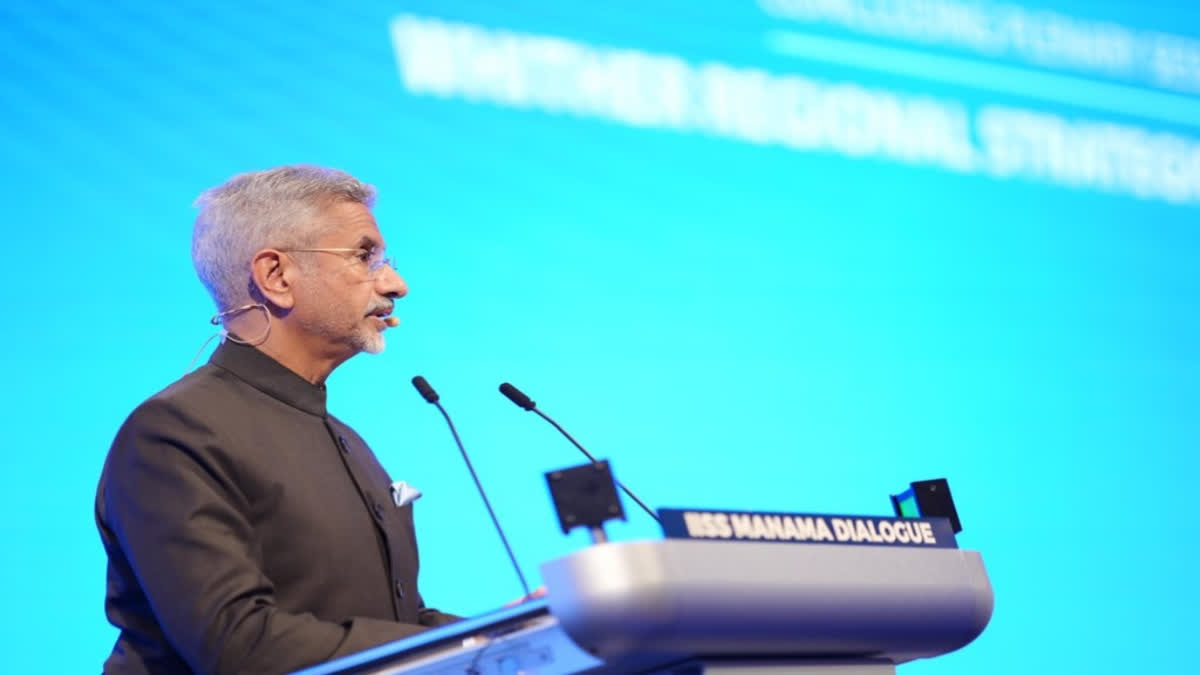New Delhi: External Affairs Minister S Jaishankar on Sunday said there must be "a foreign policy for Viksit Bharat" as he underlined that changes in foreign policy are needed amid a changing landscape. In his address at the launch of 'India's World' magazine here, he also said "when we speak about changing foreign policy, if there is talk of a post-Nehruvian construct, it should not be treated as a political attack".
Foreign policy expert C Raja Mohan chairs the editorial board of the magazine. The external affairs minister said there are "four big factors" which should cause people in India to actually ask themselves as to "what are the changes which are necessary in a foreign policy".
"One, and I happened, by coincidence, to speak about it yesterday, for many, many years, we had what someone else very pithily summed up as the 'Nehru development model'. That was book released yesterday by Dr Arvind Panagariya," he said.
A 'Nehru development model', inevitably produced a 'Nehru foreign policy' and "we seek to correct that abroad", just as efforts being made to "reform" the consequences of the model at home, Jaishankar said on Saturday, in his virtual address at the launch of the book 'The Nehru Development Model'. In his address at the Sunday's event, he reiterated that a 'Nehru development model' produced a 'Nehru foreign policy'.
"I mean, it was obvious. And, it wasn't just what was happening in our country, there was an international landscape in the 1940s, 1950s, 1960s and the 1970s which was bipolar. Then there was a unipolar landscape. And, both those landscapes have also changed," the EAM said. On top of it, in the last two decades or so, there has been a "very intense globalisation", a strong interdependence with countries. "In a way the relationship, the behaviour of states towards each other have changed," he said.
Finally, if one looks at technology, technology on foreign policy, technology on state capability, "technology on our daily existence, that too has changed", he added. "So, if the domestic model has changed, if the landscape has changed, if the behavioural patterns of states have changed, and if the tools of foreign policies have changed, how can foreign policy remain the same," he argued.
"So, my point to you today is when we speak about changing foreign policy, if there is talk of a post-Nehruvian construct, it should not be treated as a political attack. I mean, it didn't require Narendra Modi to do it, Narasimha Rao started it," Jaishankar said.
"So, I think, we need to be grounded, we need to be realistic, we need to be practical in this country, and the foreign policy discourse within track 2, and between track 2 and track 1 will certainly improve, if we move in that direction," the EAM said. In his address, he also asserted that a vision for a developed India needs a foreign policy for 'Viksit Bharat'.
"If today our aspiration at home is to become a Viksit Bharat, surely there must be a foreign policy for Viksit Bharat. And, that foreign policy in a way, I would say, we had about a decade ago suggested the need for India to start thinking about moving towards a leading power. How to be more ambitious, how to plan ahead," the EAM said.
Now, some of it is also about positioning, a country will have in a sense, if it had the most friends, the least problems. The best relationships, the "minimal baggage", and in that positioning the concept of 'Vishwa Bandhu' came up, he added. The vision of 'Viksit Bharat' laid down by Prime Minister Narendra Modi aims to build India as a developed nation by 2047 when it will complete 100 years as an independent nation.
In his address, the external affairs minister also touched upon the aspects of various tracks of diplomacy and the importance of their inter-dynamics. "If we look back the last 25 years, and I grant you, I have a vested interest in that statement, but if you look back the last 25 years in this country, track 1 has been consistently ahead of track 2, when it comes to diplomacy, foreign policy and keeping up with the world," he said.
"In fact, if you look at many of the big ideas, much of the advocacy of change, I would say, really it is interesting that track 1 has outpaced track 2. Because, I do think that this dynamic of track 1, track 2, government, think-tank, official, academic, need changes in our country," the EAM added. Track 1 diplomacy refers to official, government to government diplomacy while track 2 refers to unofficial contact and interaction in a diplomacy.
Jaishankar said "our public space discourse should not be theological, it should not be polemical, it should not come as a defence of the past versus a compulsion to move beyond the past". "So, to me a platform that signifies realism, which is contemporary, ambitious, I think it makes such a platform relevant," he added.
The EAM said if things are going to change then that begs a different question, "do we defend, manage, advance, or do we do all of the same". "How ambitious we should be, what is it that we are aiming for. And, what should be the timing for what we should do," he asked. And, if "we do raise our hedge to what degree and on what issues. I think that's also a very important concern," the minister added.
"Just like the economic debates and the economic model of this country became more open, I think foreign policy, foreign policy thinking of this country has to keep pace with what is happening in this country, and needs to be more open. And, for that it's important to have an integrated outlook," the EAM asserted.



